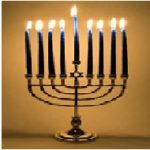First of all, Happy Hanukkah! Oh wait, or is it Channukah, or wait maybe it’s Hannukkah? I truly stumble every Hanukkah when I try to spell it in e-mails, letters and cards. OY VAY! There are at least 8 ways to spell it (that I’ve found). I guess one for each candle of the Menorah. For this blog post, I’m going to spell it in all the ways I’ve found so get ready to count.
 To celebrate Xanukkah, the famous Potato Pancake reigns! While doing some research on the potato pancake, I was really struck by how many other cultures make them. Many are Eastern European such as Latvia, Lithuania, Ukraine, but did you know that there are potato pancake recipes from Korea, India and Iran?
To celebrate Xanukkah, the famous Potato Pancake reigns! While doing some research on the potato pancake, I was really struck by how many other cultures make them. Many are Eastern European such as Latvia, Lithuania, Ukraine, but did you know that there are potato pancake recipes from Korea, India and Iran?
The word for potato pancake in Yiddish is latka or latke. Its origins are a tad fuzzy but the best one I found was that lakta means ‘patch’ in old Russian and is related to the word for pastry.
The round, golden brown pancake easily looks like a patch and is also a fairly new word, first mentioned around 1830 and heard in the 1920s in the US as more and more Eastern Europeans immigrated to America. Latkas are served with apple sauce and sour cream traditionally at Chanukah, but other cultures put various sweet and savor toppings on them as well.
 Other languages have equally as interesting names for the potato pancake. In Russian and Ukrainian, they are known as ‘deruny’ and ‘draniki’ meaning pancake. In German, they are referred to as Reibekuchen or Kartoffelpuffer, grater cakes and potato cushions, respectively. The Swedes make ‘rarakor’ meaning fritters or ‘raggmunk’, which literally translates as ‘hairy doughnuts’ . And the Irish make Boxty, their version of the potato pancake. Its name is from Gaelic ‘bacstai’ or ‘aran bocht ti’ which means ‘poor house bread’.
Other languages have equally as interesting names for the potato pancake. In Russian and Ukrainian, they are known as ‘deruny’ and ‘draniki’ meaning pancake. In German, they are referred to as Reibekuchen or Kartoffelpuffer, grater cakes and potato cushions, respectively. The Swedes make ‘rarakor’ meaning fritters or ‘raggmunk’, which literally translates as ‘hairy doughnuts’ . And the Irish make Boxty, their version of the potato pancake. Its name is from Gaelic ‘bacstai’ or ‘aran bocht ti’ which means ‘poor house bread’.
Along with the Latkas, there are other Hanouka standouts include ‘sufaniyot’ which are jam-filled donuts known as ‘pontshkes’ in Yiddish. The word ‘sufaniyot’ comes from the Hebrew word for sponge as they are round and resemble a sponge. Bimuelos, fried balls of dough dipped in honey, are also popular and come from a Sephardic word hence its Spanish look.
Whatever you eat during Chanukah and however you decide to spell it, remember that, just as potato pancakes are common to so many cultures, so are the messages of light and love of Chanukah.

Robert Aiudi, a.k.a., The Language Chef, has been known to his friends and family as a “language junkie” nearly his entire life. He is fluent in many, conversational in others and can fake it through another large amount of some of the most exotic languages in the world. He has taught and tutored many happy students, and annoyed people over the years by asking “how do you say that?”.
From his young years surrounded by speakers of three different dialects of Italian, to university in France and German and extensive work in Asia, China, Taiwan, Japan, Robert has picked up languages and breathed in the cuisines of many countries. Translating from 27 languages into English, Robert is a repository of anecdotal and factual information about languages of all sorts which adds flavor and depth to the Language Chef.
An expert amateur cook, Robert has worked in Paris in small bistro, made pizzas in Florence, wrangled recipes out of the hands of German grandmothers in the Black Forest, worked in a Chinese restaurant and had ad hoc cooking lessons in restaurants in China, Taiwan and Japan as well as various Chinatowns. Most importantly, Robert, his mom and dad, two grandmothers and lots of aunts from Italy have made culinary magic in their kitchens for generations.








